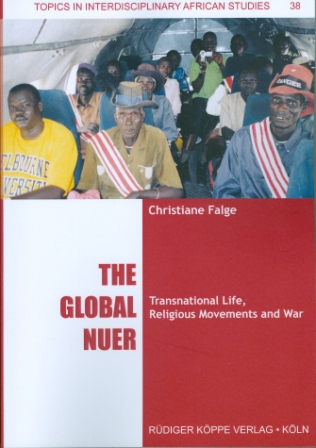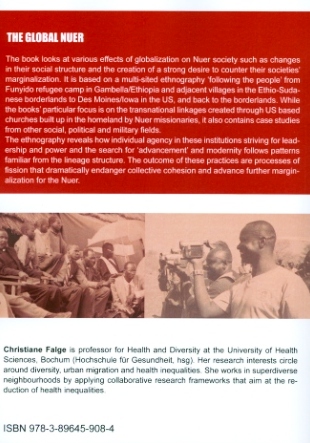

The Global Nuer
Transnational Life-Worlds, Religious Movements and War
Author: Christiane Falge. With a preface by: Thomas Zitelmann.
Series: TIAS Topics in Interdisciplinary African Studies Volume 38
2015270 pp.
9 maps, 22 colour photos, 2 b/w photos, 1 genealogical chart, 8 illustrations, 3 tables
Text language(s): English
E-book
€ 49.80
Buy 'The Global Nuer' as a downloadable PDF document directly from our online shop »
The book looks at various effects of globalization on Nuer society such as changes in their social structure and the creation of a strong desire to counter their societies’ marginalization. It is based on a multi-sited ethnography following the people from Funyido refugee camp in Gambella/Ethiopia and adjacent villages in the Ethio-Sudanese borderlands to Des Moines/Iowa in the US, and back to the borderlands. While the books’ particular focus is on the transnational linkages created through US based churches built up in the homeland by Nuer missionaries, it also contains case studies from other social, political and military fields.
The ethnography reveals how individual agency in these institutions striving for leadership and power and the search for advancement and modernity follows patterns familiar from the lineage structure. The outcome of these practices are processes of fission that dramatically endanger collective cohesion and advance further marginalization for the Nuer.
About the author:
Christiane Falge is professor for Health and Diversity at the University of Health Sciences, Bochum/Germany (Hochschule für Gesundheit, hsg). Her research interests circle around diversity, urban migration and health inequalities. She works in superdiverse neighborhoods by applying collaborative research frameworks that aim at the reduction of health inequalities.
Following the links below, you will find further studies focusing on escape/refuge, migration and the position of asylees in Germany and African societies:
Accompanying material:
- Asylverfahren und Gerechtigkeit
(ISBN 978-3-89645-854-4 ) - Flucht als Politik
(ISBN 978-3-89645-347-1 ) - Lifeworlds of Young Men beyond Migration and Immobility in Pikine, Senegal
(ISBN 978-3-89645-914-5 ) - Migration and Conflict
(ISBN 978-3-89645-903-9 ) - Nation im Exil?
(ISBN 978-3-89645-826-1 ) - Spaces in Movement
(ISBN 978-3-89645-905-3 )
Cross-reference:
- “Safe Havens” for Refugees
(ISBN 978-3-89645-339-6 ) - Arbeit, Sklaverei und Erinnerung
(ISBN 978-3-89645-349-5 ) - Global Heritage – Tradition and Innovation
(ISBN 978-3-89645-249-8 ) - Nomades des espaces interstitiels
(ISBN 978-3-89645-252-8 )
Reviews
In this regard the two studies by Falge and Shandy are an interesting addition. They provide the in-depth background to the formation of a conflict-generated diaspora, an ethnography of flight, arrival, and adaptation. The Nuer, both South Sudanese and Ethiopian, have a history of migration both as refugees in Ethiopia and as international migrants in America. For the Nuer communities portrayed in these two volumes, war and migration create a rupture, not a continuum, in their traditional pastoral life. ‘From the perspective of the Nuer refugees, incorporation into the US society is simply one more point on a trajectory of migration. The process of incorporation is open-ended and will endure through the life span of each individual, their offspring, that of the next generation, and perhaps, beyond. Similarly, incorporation in the United States does not signal a severing of ties to Africa’, argues Dianne Shandy in her study (p. 59). In these ethnographies, the refugees are not victims but agents of their own cultural production and reproduction, as many of the personnel portrayed have experienced a life of uncertainty and movement from war zone to refugee camp to their resettlement in the United States. [...]
Falge’s and Shandy’s investigations span an impressive time frame and include multiple geographical arenas, from the refugee camps of Ethiopia, Kenya to the United States. Thus, the studies are able to detail the war experience as well as the formation of an emerging diaspora in the United States. Falge’s description of the oral expression of the emergence of an Itang diaspora in Ethiopia is stunning in this regard. While Falge focuses on aspects of religion as a shifting mechanism of collective identification, Shandy brings to light an ethnography of process, bureaucracy, and adaption. Crucial to understanding the realities of migrants is Shandy’s description of the administrative processes that ‘make refugees’. [...]
While in both studies the idea of transnational networks is of seminal importance, Christiane Falge builds her investigation on the inner workings of Christian congregational networks, that inform the Nuer transnational linkages.
Building on a theoretically rich opening chapter (‘Orientations’, pp.17–48), Falge makes a case for an actor-based approach focusing on lineages with different religious and political identities. Based on an impressive duration of fieldwork, the book illustrates the necessity of understanding the historical formation, background, and genesis of migration through long-term ethnographic fieldwork. Falge’s book brings to the fore the complex life-worlds and challenges of a generation of war and conflict-induced migration. Migration is not a unilineal process: all three studies are proof of the need to understand transnational systems linking the diaspora and homeland communities. In this, Falge and Shandy answer questions that the volume edited by Kay Kaufman Shelemay and Steven Kaplan rightfully opens.
Alexander Meckelburg in Aethiopica, 22/2019, 262-268
| « back | Print version | [top] |
 Books
Books Audio
Audio Biographies
Biographies Series
Series Festschrifts
Festschrifts Journals
Journals